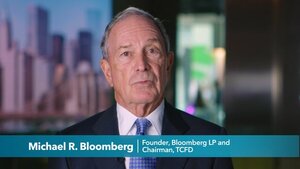Why more companies are supporting transparency about climate impacts
Companies need to come clean to investors about climate change impacts on their businesses, a panel that advises G20 countries said Wednesday. The 31 companies and investors who form that task force have already backed the recommendations.

Michael Bloomberg shares a video message on why climate risk disclosure is important for businesses alongside the launch of the TCFD Recommendations report on Wednesday, December 14, 2016.
See fsb-tcfd.org/ for more information.
Follow us via twitter.com/FSB_TCFD
Secretariat TCFD
“This is a solution by the market, for the market,” wrote former New York City mayor Michael Bloomberg and Bank of England governor Mark Carney, arguing that potential climate costs should be incorporated into financial statements. And the practice seems to be catching on.
On Wednesday, the Task Force on Climate-Related Financial Disclosures, headed up by Mayor Bloomberg, presented its recommendations. In a report commissioned by the Financial Stability Board, a group of global regulators chaired by Dr. Carney, the 31 companies and investors who make up the task force called for companies to be more transparent about how they assess climate risks.
Companies, investors, and experts increasingly agree that it’s important to know what effect climate change – and efforts to adapt to or mitigate it – are having on their bottom line.
“The right information will allow optimists and pessimists, skeptics and evangelists, to back their convictions with their capital,” wrote Bloomberg and Carney in an editorial for The Guardian.
The task force’s report distinguishes between two sets of risks, notes Bob Ward, policy and communications director at the Grantham Research Institute at the London School of Economics (LSE), in a phone interview with The Christian Science Monitor. One is the impact of climate change, and the other is the risks of shifting to a low-carbon economy.
“If you are an international oil company, have you worked out how your business will be affected by the Paris Agreement?” he asks, observing that countries’ efforts to combat climate change could have a significant impact on companies and investors.
In the past, few companies discussed either set of potential risks. In recent years, the issue has become increasingly salient, experts say. Standard & Poor’s analysis incorporates climate impacts “where we think those risks are pertinent,” says Michael Wilkins, global head of environmental and climate risk research at S&P Global Ratings and a member of the panel, in a phone interview with the Monitor.
An increasing number of companies have been reporting about their efforts to reduce their emissions, notably through the Carbon Disclosure Project (now the CDP), Mr. Ward notes.
But, he says, “they’re not all reporting on what assumptions they’re making about the future and climate change.”
That means different businesses may be making different assumptions, presenting challenges for investors who want to weigh the risks involved in a company's future. That’s where the task force comes in, says a representative of automotive company Daimler who participated in the panel.
The task force’s recommendations give investors “tools and criteria for their evaluation,” the company said in a statement emailed to the Monitor.
This, in turn, would provide investors with better analysis, argues Mr. Wilkins of S&P.
“Having enhanced disclosure … would just make the quality of the analysis better and more transparent,” he says.
Some members of the G20 group of major economies may ultimately require companies to report this data, in order to ease the transition to a low carbon economy and prevent financial instability down the road. The idea is that, by reporting the data, companies will have to think about the risks, explains Ward of LSE.
It's also possible that reporting on climate risks could so benefit companies that they choose to publish the information even if not required by law.
“Law would force the issue,” explains Wilkins, but “investors are themselves wanting to adapt their portfolios for the transition to low carbon … regardless of law.”
That has already created "strong peer pressure" to report on these risks, says Ward.
The 31 companies and investors who make up the task force have already endorsed its recommendations, and more look set to follow them. But not everyone is on board.
Exxon, for instance, which made headlines last year for reportedly covering up its knowledge of climate change to protect its bottom line, is currently being investigated by the Securities and Exchange Commission over its climate change accounting practices. To Ward, the company’s refusal to publish details indicates that Exxon may be “gambling on Paris [the Paris Agreement] being implemented.”
Richard Tol, a professor of economics at the University of Sussex, takes a skeptical view of the task force. In an email to the Monitor, he argues that, because climate change will impact future assets, “projections … are contingent and uncertain.” He argues that any effort to report climate mitigation efforts would therefore be more of an attempt to “curry favour with green consumers” than an aid to investors or companies.
The companies involved, however, say they see transparency about the financial implications of climate change as a way to help them thrive in a changing world.
The data “will allow investors to take advantage of the opportunities that this transition may bring about,” drawing attention to companies' diversification efforts in growing fields like renewable energy and green building, says Wilkins.

